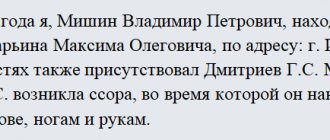On the correct application of the norm of the Criminal Code of the Russian Federation on changing the category of crime to a less serious one, see Resolution of the Plenum of the Supreme Court of the Russian Federation dated May 15, 2018 N 10 “On the practice of application by courts of the provisions of Part 6 of Article 15 of the Criminal Code of the Russian Federation”
Having established in a guilty verdict several crimes that form a totality (Article 17 of the Criminal Code of the Russian Federation), the court is obliged to impose a final punishment on the guilty person, using the rules for assigning punishment for a set of crimes.
First, the court imposes punishment for each crime included in the totality separately (Part 1 of Article 69 of the Criminal Code of the Russian Federation). In this case, the court uses the general principles of sentencing and special rules for sentencing for one crime, which were covered earlier.
Then the court must determine which category (Article 15 of the Criminal Code of the Russian Federation) each of the crimes included in the totality belongs to.
In Art. 69 of the Criminal Code of the Russian Federation contains three methods (options) of assigning final punishment for a set of crimes:
- absorption of a less severe punishment by a more severe one;
- partial addition of punishment;
- full addition of punishment.
The court, depending on the categories of crimes included in the totality, has the right to choose either one of two options, or one of all three. If all the crimes included in the totality are crimes of minor and (or) moderate gravity, then the court has the right to choose the option of imposing the final punishment from all three options (Part 2 of Article 69 of the Criminal Code of the Russian Federation). If at least one of the crimes included in the totality belongs to the category of grave or especially grave, then the court has the right to choose the option of imposing the final punishment from only two options: it has the right to use either partial addition of punishment or complete addition of punishment (Part 3 Article 69 of the Criminal Code of the Russian Federation).
Partial addition of punishments
The court chooses from all the imposed punishments the punishment that is the most severe in its type (based on Article 44 of the Criminal Code of the Russian Federation) and in its size (term). Next, the court increases it by adding to it the amount (term) of a similar type of punishment, and such an increase occurs in units of calculating the amount (terms) of types of punishment provided for in Part 1 of Art. 72 of the Criminal Code of the Russian Federation. In this case, the final punishment in any case must be greater than any of the punishments imposed for a separate crime.
What are the rules for sentencing for re-conviction?
What is the punishment if you are convicted three times under Art. 264? The second time it was 1.5 years probation
Lawyer Lebedev Z.S.
Good afternoon According to Article 15 of the Criminal Code, depending on the nature and degree of public danger, the acts provided for by this Code are divided into crimes of minor gravity, crimes of medium gravity, serious crimes and especially serious crimes. Crimes of minor gravity are recognized as intentional and careless acts, for the commission of which the maximum punishment provided for by this Code does not exceed three years of imprisonment. Crimes of average gravity are recognized as intentional acts, for the commission of which the maximum penalty provided for by this Code does not exceed five years of imprisonment, and careless acts, for the commission of which the maximum penalty provided for by this Code exceeds three years of imprisonment. Serious crimes are intentional acts for which the maximum punishment provided for by this Code does not exceed ten years of imprisonment. Particularly serious crimes are intentional acts, the commission of which is punishable by this Code in the form of imprisonment for a term of over ten years or a more severe punishment. Taking into account the actual circumstances of the crime and the degree of its public danger, the court has the right, in the presence of mitigating circumstances and in the absence of aggravating circumstances, to change the category of the crime to a less serious one, but not more than one category of crime, provided that for committing the crime specified in part three of this article, the convicted person is sentenced to a sentence not exceeding three years of imprisonment, or another more lenient punishment; for committing a crime specified in part four of this article, the convicted person is sentenced to a punishment not exceeding five years of imprisonment, or another more lenient punishment; for committing a crime specified in part five of this article, the convicted person is sentenced to a punishment not exceeding seven years of imprisonment. According to Article 86 of the Criminal Code, a person convicted of committing a crime is considered to have a criminal record from the day the court’s conviction enters into legal force until the criminal record is expunged or removed. A criminal record in accordance with this Code is taken into account in case of recidivism of crimes, imposition of punishment and entails other legal consequences in cases and in the manner established by federal laws. A person released from punishment is considered to have no criminal record. A criminal record is expunged: a) in relation to persons on probation - upon expiration of the probationary period; b) in relation to persons sentenced to more lenient punishments than imprisonment - after one year after serving or executing the sentence; c) in relation to persons sentenced to imprisonment for crimes of minor or medium gravity - after three years after serving the sentence; d) in relation to persons sentenced to imprisonment for serious crimes - after eight years after serving the sentence; e) in relation to persons convicted of especially serious crimes - after ten years after serving the sentence. If the convicted person, in accordance with the procedure established by law, was released early from serving the sentence or the unserved part of the sentence was replaced by a more lenient punishment, then the period for expunging the criminal record is calculated based on the actually served term of the sentence from the moment of release from serving the main and additional types of punishment. If the convicted person behaved impeccably after serving his sentence and also compensated for the damage caused by the crime, then, at his request, the court may remove his criminal record before the expiration of the criminal record. Expungement or removal of a criminal record cancels all legal consequences provided for by this Code associated with a criminal record. According to Article 18 of the Criminal Code, recidivism of crimes is the commission of an intentional crime by a person who has a criminal record for a previously committed intentional crime. Recidivism of crimes is considered dangerous: a) when a person commits a serious crime for which he is sentenced to actual imprisonment, if previously this person was sentenced to imprisonment two or more times for an intentional crime of moderate gravity; b) when a person commits a serious crime, if he was previously convicted of a serious or especially serious crime. Recidivism of crimes is recognized as especially dangerous: a) when a person commits a serious crime for which he is sentenced to actual imprisonment, if this person was previously convicted twice convicted of a serious crime to actual imprisonment; b) when a person commits a particularly serious crime, if he has previously been convicted of a serious crime twice or has previously been convicted of a particularly serious crime. When recognizing a recidivism of crimes, the following are not taken into account: a) convictions for intentional crimes of minor gravity; b) convictions for crimes committed by a person under the age of eighteen; c) convictions for crimes for which the conviction was deemed suspended or for which a deferment of execution of the sentence was granted, if the conditional conviction or deferment of execution of the sentence was not canceled and the person was not sent to serve the sentence in prison, as well as convictions expunged or expunged in accordance with the procedure, established by Article 86 of this Code. Recidivism of crimes entails a more severe punishment on the basis and within the limits provided for by this Code, as well as other consequences provided for by the legislation of the Russian Federation. According to Article 68 of the Criminal Code, when assigning punishment for a recidivism, dangerous recidivism or especially dangerous recidivism of crimes, the nature and degree of public danger of previously committed crimes, the circumstances due to which the corrective effect of the previous punishment turned out to be insufficient, as well as the nature and degree of public danger again crimes committed. The term of punishment for any type of recidivism of crimes cannot be less than one third of the maximum term of the most severe type of punishment provided for the crime committed, but within the sanction of the relevant article of the Special Part of this Code. In case of any type of recidivism of crimes, if the court establishes mitigating circumstances provided for in Article 61 of this Code, the term of punishment may be assigned less than one third of the maximum term of the most severe type of punishment provided for the crime committed, but within the sanction of the relevant article of the Special Part of this Code, and in the presence of exceptional circumstances provided for in Article 64 of this Code, a more lenient punishment than provided for this crime may be imposed. According to Articles 61 and 62 of the Criminal Code, the following are recognized as mitigating circumstances: a) the commission of a crime of minor or moderate gravity for the first time due to a random combination of circumstances; b) the minority of the perpetrator; c) pregnancy; d) the presence of young children with the perpetrator; e) committing a crime due to a combination of difficult life circumstances or out of compassion; f) committing a crime as a result of physical or mental coercion or due to financial, official or other dependence; g) commission of a crime in violation of the conditions of legality of necessary defense, detention of the person who committed the crime, extreme necessity, justified risk, execution of an order or instruction; h) illegality or immorality of the behavior of the victim, which was the reason for the crime; i) confession, active assistance in solving and investigating a crime, exposing and prosecuting other accomplices in a crime, searching for property obtained as a result of a crime; j) provision of medical and other assistance to the victim immediately after the commission of a crime, voluntary compensation for property damage and moral harm caused as a result of the crime, and other actions aimed at making amends for the harm caused to the victim. When assigning a punishment, circumstances not provided for in the first part of this article may be taken into account as mitigating factors. If a mitigating circumstance is provided for by the relevant article of the Special Part of this Code as a sign of a crime, it in itself cannot be taken into account again when assigning punishment. In the presence of mitigating circumstances provided for in paragraphs “and” and (or) “k” of part one of Article 61 of this Code, and in the absence of aggravating circumstances, the term or amount of punishment cannot exceed two-thirds of the maximum term or amount of the most severe type of punishment provided for in the relevant article of the Special parts of this Code. In the case of concluding a pre-trial agreement on cooperation in the presence of mitigating circumstances provided for in paragraph “and” of part one of Article 61 of this Code, and in the absence of aggravating circumstances, the term or amount of punishment cannot exceed half the maximum term or amount of the most severe type of punishment provided for in the relevant article of the Special Part of this Code. The provisions of part one of this article do not apply if the corresponding article of the Special Part of this Code provides for life imprisonment or the death penalty. In this case, the punishment is imposed within the sanction of the relevant article of the Special Part of this Code. In the case of concluding a pre-trial agreement on cooperation, if the relevant article of the Special Part of this Code provides for life imprisonment or the death penalty, these types of punishment are not applied. In this case, the term or amount of punishment cannot exceed two-thirds of the maximum term or amount of the most severe type of punishment in the form of imprisonment, provided for by the relevant article of the Special Part of this Code. The term or amount of punishment imposed on a person in respect of whom a criminal case is considered in the manner prescribed by Chapter 40 of the Criminal Procedure Code of the Russian Federation cannot exceed two-thirds of the maximum term or amount of the most severe type of punishment provided for the crime committed, and in the case, specified in Article 226.9 of the Criminal Procedure Code of the Russian Federation - one-half of the maximum term or amount of the most severe type of punishment provided for the crime committed. According to Article 74 of the Criminal Code, if, before the expiration of the probationary period, the conditionally convicted person has proven his correction by his behavior, compensated for the damage (in whole or in part) caused by the crime, in the amount determined by the court decision, the court, on the proposal of the body monitoring the behavior of the conditionally convicted person, may decide to revoke a suspended sentence and expunge a convicted person’s criminal record. In this case, the suspended sentence may be revoked after the expiration of at least half of the established probationary period. If a conditionally convicted person has evaded the fulfillment of the duties assigned to him by the court, has evaded compensation for damage (in whole or in part) caused by the crime in the amount determined by the court decision, or has committed a violation of public order for which he was brought to administrative responsibility, the court, upon presentation the body specified in part one of this article may extend the probationary period, but not more than by one year. If a conditionally convicted person, during an extended probation period in connection with his evasion of compensation for damage caused by a crime, in the amount determined by a court decision, systematically evades compensation for said damage, the court, upon the proposal of the body specified in part one of this article, may also make a decision on the revocation of a suspended sentence and the execution of a sentence imposed by a court verdict. If a conditionally convicted person, during the probationary period, systematically violated public order, for which he was brought to administrative responsibility, systematically failed to fulfill the duties assigned to him by the court, or escaped from control, the court, upon the proposal of the body specified in part one of this article, may make a decision to revoke the conditional sentence. conviction and execution of punishment imposed by a court verdict. If a conditionally convicted person commits a crime due to negligence or an intentional crime of minor or medium gravity during the probationary period, the issue of canceling or maintaining the conditional sentence is decided by the court. If a conditionally convicted person commits an intentional grave or especially grave crime during the probationary period, the court revokes the conditional sentence and imposes a punishment on him according to the rules provided for in Article 70 of this Code. According to the same rules, punishment is imposed in cases provided for in part four of this article. The rules established by parts four and five of this article also apply if the crimes specified in these parts were committed before the sentence providing for a suspended sentence came into force. In this case, trial of a new crime can take place only after the sentence providing for a suspended sentence has entered into legal force. Thus, since the new crime was committed in a state of relapse, the imposed punishment cannot be less than 1/3 of the maximum sentence provided for this crime. The possibility of maintaining a suspended sentence depends on the category of the crime committed.
Sincerely, lawyer Zakhar Lebedev, partner of the law firm Antonov and Partners.
Still have questions for your lawyer? Ask them right now here, or call us by phone in Moscow +7 (499) 288-34-32 or in Samara +7 (846) 212-99-71 (24 hours a day), or come to our office for a consultation (by pre-registration)!
What types of punishments can be imposed based on the totality of sentences?
When rendering a final verdict, the judge may choose one of the following preventive measures for the accused:
- Fine. The total amount of the penalty should not exceed five million rubles.
- Termination of a title, award or rank.
- Deprivation of the opportunity to engage in a certain type of activity. If this is the main punishment, then the maximum term is 5 years. If such a restriction is used as an additional preventive measure, it can be assigned for no more than 3 years.
- Restriction of freedom. The maximum period is 4 years.
- Limitation of promotion in military service (no more than two years).
- Mandatory work. With a total of sentences, a convicted person can receive a maximum of 480 hours of compulsory labor.
- Correctional labor – up to two years.
- Deprivation of liberty. Such punishment may involve a certain period or be imposed for life. The total term of imprisonment cannot exceed 30 years.
Important
If all the acts that were committed in the aggregate relate to crimes of the least or medium gravity, or are considered an attempt or preparation for a very serious crime, then the term here will be assigned according to the principle of absorption of punishments. The law says so. It should also be noted that the term for the most serious crime, which was committed in conjunction with others, cannot be more than half the amount of the highest punishment provided for by the Criminal Code for the crime.
Stages
When considering a set of crimes, it is necessary to go through two main stages :
- Determination of a preventive measure for each act separately.
- Final verdict:
- absorption of the lesser by the more significant. When a citizen commits several crimes of minor or moderate gravity, as well as in the case of an attempted grave or especially grave crime, the most severe preventive measure is allowed to absorb the remaining sentences. This option for calculating a preventive measure is the simplest when the court is considering a set of offenses, since in fact the offender is sentenced for the crime for which the greatest measure of liability is provided;
- complete addition. In cases where one or more acts from a combination are grave or especially grave, the principle of adding up preventive measures is applied. Complete addition implies that, on the basis of a court decision, all preventive measures that were obtained when assessing separately all the offenses committed by a citizen are added together in full;
- partial addition. In such a case, the preventive measures for the remaining episodes are partially added to the term imposed for the maximum serious crime. The level of preventive measures added to the main punishment depends on the level of severity of the crimes committed.
The final punishment, which is obtained as a result of partial or full summation of preventive measures, should not ultimately exceed 1/2 of the longest term of imprisonment for the most serious crime in the aggregate.
When considering the totality of sentences, two main stages are required:
- Determination of a preventive measure for each act separately.
- Final verdict:
- complete addition. The unserved punishment under the previous court decision is added to the punishment imposed on the basis of the latest court verdict;
- partial addition. The partially unserved part of the vulgar punishment is added to the last punishment.
The final preventive measure must exceed the punishment for the last offense and for the unserved part of the previous offense.
When making a final decision, authorized persons must find out what part of the past sentence has not been served by the perpetrator of the crime.








